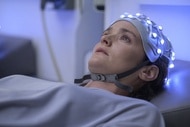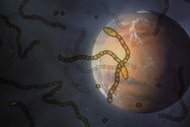Create a free profile to get unlimited access to exclusive videos, sweepstakes, and more!
‘The Martian' movie's toilet tuber could happen: NASA testing machine that turns poop into veggie fertilizer

Matt Damon growing potatoes from his own poop in The Martian may be closer to reality than some sci-fi fans might think. Thanks to a new system that replicates waste-reclamation practices used by communities on Earth to generate clean water and fertilizer, astronauts may soon have access to fresh vegetables over long spaceflights.
According to a release, this technology — dubbed the Organic Processor Assembly — comes from NASA and University of South Florida professor Daniel Yeh, the latter of whom also developed the NEWGenerator resource recovery machine that is helping achieve these same principles in India and South Africa. Cleaning up toilet water into useful components is helpful everywhere, both in earthbound communities and the hardships of space.
“Over the years, our team has gotten pretty good at coming up with technologies that work well on Earth,” Yeh said in a statement. “Developing resource-recovery solutions for space was something new. It presented a whole new series of design challenges to overcome, such as those related to mass, volume, modularity, and reduced gravity.”
Around the size of a washer-dryer combo (the smaller, stackable kind), the Organic Processor Assembly heads to NASA’s Kennedy Space Center next week, where it will be tested in Principal Investigator Luke Roberson's lab. That means churning through four astronauts’ worth of wastewater (synthetic, thankfully) and generating clean water. Then, that water's excess nutrients are conditioned into fertilizer thanks to an algae bioreactor.
Not only does it need to work, though, it needs to work with everything else on the spacecraft. But if it works, it'll be a big step in the right direction for longer manned missions.
“NASA can only resupply a limited mass and volume to the Moon and Mars habitats. This limitation forces research advancements to provide a reliable, closed-loop system between food consumption and production,” said Roberson. “With the OPA technology, we’re investigating if we can sustainably begin recycling human wastewater resources into potable water and fertilizer nutrients. There is a big difference between a fresh and canned strawberry in both nutrient content and interaction with your senses.”
This tech isn't just a morale boost: It could help upgrade the existing fresh veggie system — called Vegetable Production System or VEGGIE, suitably — into something sustainable. Although it's much smaller, the current system is limited in resources since it uses "clay-based soil and fertilizer." The astronauts just have to avoid thinking about their food growing in stuff taken "directly from the toilet."
"Waste not, want not" has never been so applicable. But that's what astronauts get when looking beyond the ISS. Extended space travel means food needs and waste problems, with storage already at a premium. So why not make the most of the stuff that's going to be generated naturally? If it was good enough for Matt Damon, it's good enough for NASA.
NASA expects to make a decision on whether the Organic Processor Assembly will go to the Moon over the next few years, possibly through the Artemis program that hopes to launch in 2024. Another Organic Processor Assembly will stay on terra firma for continued testing ... but if it works on the Moon, there's no telling the distances to which our own by-products could take us.



























